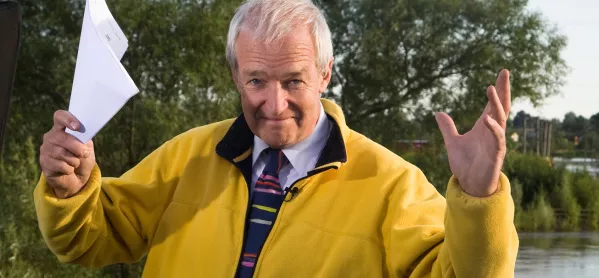I was hopeless at school. Apart from music, I was a complete dunce. But I was fortunate to have two memorable teachers who rescued me at opposite ends of my school career.
I went to a prep school called Pilgrims in the cathedral close at Winchester. It was actually the choir school for the cathedral, so I lived and breathed medieval England from the age of 7 until I was 13. The sound of the cathedral bells was my daily existence and we sang for three hours every day.
I loved music but I was bottom of everything else until an English teacher called Rodney Blake came along when I was 9 or 10. He had an inspirational attitude to English and he encouraged an imaginative use of adjectives, which has stayed with me to this day. Under all other circumstances, I was hopeless but he really brought something out of me.
He went on to become headmaster, although he was later sacked for having an affair with the piano teacher. I lost trace of him until someone put me back in touch about 10 years ago. He had returned to New Zealand, where he came from. He was living a forlorn life, and dying of heart disease.
The consequences of being a dunce afflicted me throughout my secondary education. I went to a very indifferent public school, which I won’t name, and I came out having scraped five poor grades at O-level and a grade C in English at A level.
So I went to Scarborough Technical College, where I was transformed into a major intellectual force by dint of being one of only eight students taking A levels. All my classes were taught by Bob Thomas, who was from the Welsh valleys and had been a lorry driver. I did law and economics and he was brilliant. He achieved in one year what five years at public school had failed to do.
He lives in Pembrokeshire now and we still exchange Christmas cards. What made him special, I think, was that he had infinite respect for us as students. He really thought we were worth something, which no one had ever made me feel at public school.
I was extremely badly taught academically, and that made me realise that a good education is the most decent thing you can give anyone and is a basic right. That view is reinforced when you become a parent.
As well as Channel 4 News, I also present First Edition, which is a weekly news and current affairs programme for 10- to 15-year-olds. What I’ve brought to that, based on my own experience, is a belief that young people respond best to being treated with respect. You can’t talk down to them.
The other educational project I’m involved with is On The Line, which is sponsored by Oxfam, Voluntary Service Overseas, Christian Aid, the World Wide Fund for Nature and Channel 4.
I wanted to come up with an idea that was relevant to the theme of the millennium but gave people a sense of who else was sharing the planet with them. It struck me that one practical way was to link children who were living on the meridian line, so they were all waking up, having breakfast (if they are lucky) and going to school at the same time.
We’ve linked more than 500 schools, from Britain to Ghana. It has huge benefits in lots of subjects - languages, IT, geography, history, citizenship. I’ve tried to make as much time as I can to get directly involved and visit classrooms. It started as a madcap idea and to see it come to fruition has been fantastic.
TV presenter Jon Snow was talking to Nigel Williamson
This article was originally published in 2000
CV: Jon Snow
Born: 1949 in Ardingly, West Sussex
Education: The Pilgrims’ School, Winchester, Scarborough Technical College, Scarborough
Career: Jon Snow is a journalist and TV presenter, he is most known for being Channel 4‘s longest-running presenter.
